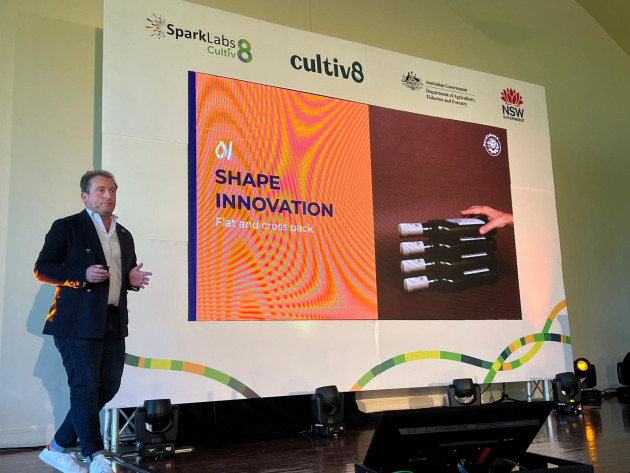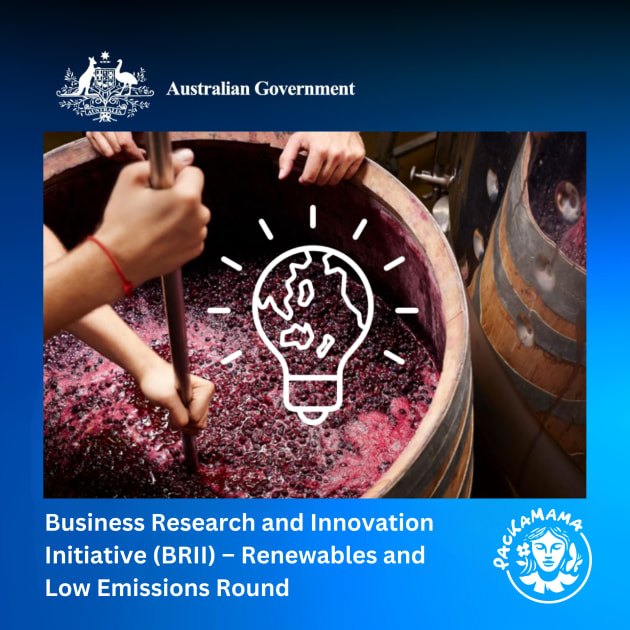Packamama has secured a $100,000 feasibility grant from the Australian government under the Business Research and Innovation Initiative (BRII), Renewables and Low Emissions Round.
This grant – part of $1.43 million for wine packaging, safe drinking water, and energy efficiency in commercial fishing to 15 small and medium sized Australian enterprises – will support Packamama's efforts to test the technical and commercial viability of creating sustainable packaging for Australian wines, including for some premium wines and longer shelf-life commercial wines.
Packamama is committed to studying the technical and commercial viability of delivering a solution that will advance the future of sustainable wine packaging, including for some premium wines and longer shelf-life commercial wines, and enhance Australia’s reputation as a sustainable innovation leader.
“Wine is a highly diverse product, and the premium wine segment and longer shelf-life commercial wines – mostly for bottled exports – are likely to benefit from different solutions to what we offer now,” Santiago Navarro, CEO and founder of Packamama, told PKN.

“There is much we can do, tweak and present, and we believe we are well placed for this. We believe we were chosen as we stand a better-than-average chance of cracking the code to non-glass wine bottle packaging with longer than current shelf-life.”
Kick-off meetings between Packamama, the Australian government and Wine Australia were held on 19 December, with the project officially commencing this week. It involves comprehensive feasibility studies over the next four months.
Packamama’s project will build upon its successful 100 per cent recycled PET eco-flat bottle, designed primarily for commercial wines, to test for a new packaging solution that supports some premium wine aging and longer shelf-life commercial wines for export.
Key focus areas include:
- Advanced Materials – Researching polymers and performance additives to overcome oxygen permeability and aroma absorption, enhancing shelf-life and wine protection.
- Innovative Design – Digitally simulating the bottle design and shelf-life performance to achieve the performance and aesthetic standards expected of some premium Australian wines.
- Scalable Production – Exploring manufacturing technologies to enable wide-scale adoption across Australia and beyond.
“We will be using our market learnings and polymer packaging knowledge, and we will leave no stone unturned. The outcome may not be a flat-pack bottle, but it could also be. But for sure, it will address triple bottom line sustainability of planet, people, and profit.” Navarro added.
“We are excited to lead the way in transforming the wine industry’s approach to packaging. This grant allows us to accelerate our vision of combining sustainability with functionality to better meet the demands of more Australian wine producers and consumers, including those overseas.
“By moving beyond traditional glass, we can significantly reduce emissions and contribute to Australia’s net-zero goals.”

Supported by the Department of Industry, Science and Resources, and Wine Australia, the initiative addresses a significant challenge for the wine industry – reducing carbon emissions while maintaining the high-quality standards associated with premium wine packaging.
Manufacturing wine packaging and transporting packaged wine accounted for 74 per cent of the industry's carbon emissions in 2020-21, due to the weight of glass bottles and their energy intensive production.
Packamama’s approach aims to deliver a lighter, more sustainable solution that meets consumer expectations for premium wine quality.
“This initiative is helpful for two reasons, both cash and contacts. The government grant allows us to carefully take more financial risk in small amounts,” said Navarro.
“We’re respectful that this is taxpayers’ money. But we will need to push the envelope in order to achieve the goals of slashing emissions for wines that need longer shelf-life than the present offering might allow.
“In addition to cash, there are contacts, and it is invaluable to now have open doors to Wine Australia in a way we have not had before.
“They want to see us succeed as we are innovating to solve their problems. So, we will leverage this all we can during the next few months and hopefully build a multi-decade relationship with the single organisation that can do most and achieve most to futureproof Australian wine.”
Packamama’s initiative aligns closely with the Australian wine industry’s Emissions Reduction Roadmap, which targets a 42 per cent reduction opportunity that can be achieved by 2030.







